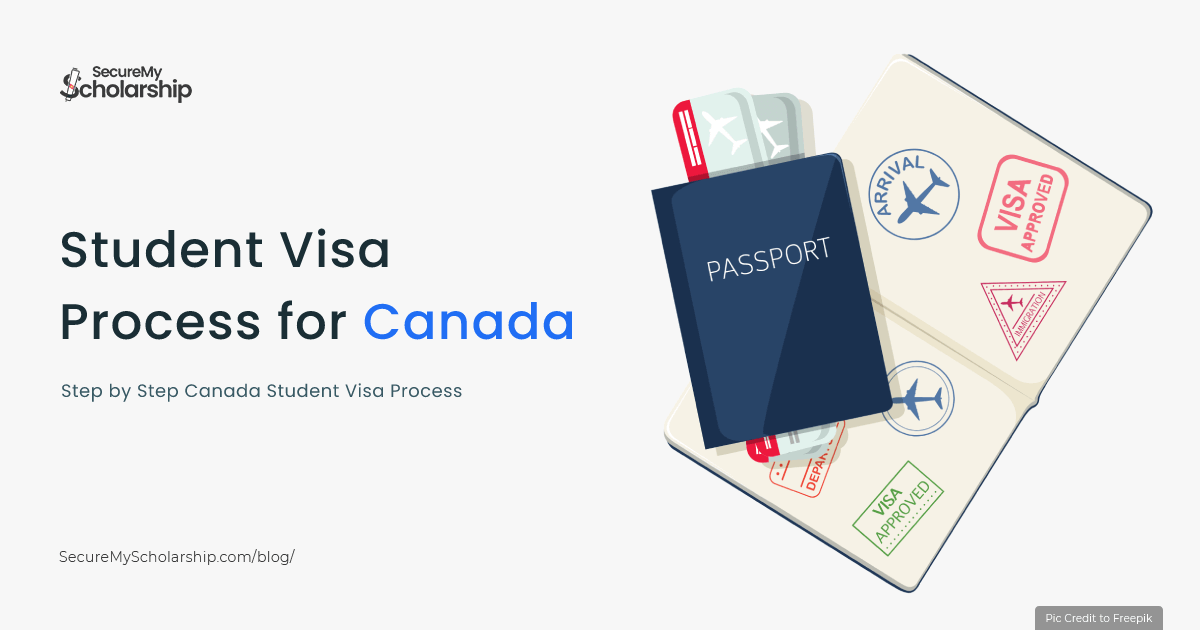Procedure for Student Visa in Canada 2025 – Canada is one of the favorite destinations for many students across the globe and especially Indians, as it is popularly said there are more Indians employed or studying in than in other nations. Moreover, because of this diversity in culture and affordability in terms of quality education and world-class infrastructure, out of every 10 Indians, seven prefer to go to Canada. In our earlier blogs, we have discussed all types of Intakes in Canada in 2025 and the application procedure for a swift admission.
However, the one thing we are going to discuss today is all about Visa Application Process, which is an essential checklist for studying in Canada. You might have many questions about how and when to start the visa application process for Canada. Therefore, in this blog, you will get to know the entire step-by-step information to apply for a student visa in Canada. We will provide the procedure for student visa in canada 2025, what you need to do, and links to helpful resources. Let’s get started!

Eligibility Criteria Procedure for Student Visa in Canada
For applying for Canada Student Visa, some criteria are mandatory to follow. Therefore, below are some of them mentioned.
Passed From Designated Learning Institution (DLI)
DLI is an institution approved by the government, and completing your schooling gives you credibility. In India, mostly all government-owned schools and colleges fall into this category. Also, good and reputed private institutions are part of it.
Language Requirements
If you are going from India or any other nation to Canada, you must show them your proficiency in the English language. How can you show that? So, you must have IELTS, TOEFL, or PRE. These exams are essential, and there is no hard and fast rule only to have one; you can only clear one of the exams.
Financial Backbone
To say it or not, having sound finances can help you through your study abroad dream because foreign countries are a little expensive compared to what you can get to remain in your own country. However, you cannot reach the quality of education, exposure, and opportunities you may get in foreign universities.
So, get ready and find scholarships to help you while applying to universities. You may get a chance to get merit-based scholarships or an early bird fee waiver, depending on intakes and universities. You need to show the bank statements and proof that you can afford education in Canada. Have enough financial support to cover your tuition fees, living expenses, and return transportation costs.
No Dirty Crime
Of course, criminals could not travel anywhere to be in a good police record, having no criminal history. Remember to stay healthy because you are going to Canada to study, not for any treatment.
No Intention of Staying Back
Study Visa is valid only for the study period. So, you must show that you will return after completing your studies. After your study visa ends and you still wish to work in Canada, then you have to apply for a work permit.
Application Procedure for Student Visa in Canada
Now that you meet the eligibility criteria for a student visa, it’s time to start collecting the required documents. The first step is to obtain a Letter of Introduction from Immigration, Refugees and Citizenship Canada (IRCC). This can be done by completing an online application. Next, you will need to submit various documents to IRCC, including –
– A valid passport or travel document
– Two recent passport photographs
– Your Letter of Introduction
– Proof of acceptance at a DLI
– Proof of financial support
– A medical examination report
Canada Student Visa Processing Fee
The student visa processing fee, is currently CAD 150. This fee must be paid online when you submit your student visa application.
Canada Student Visa Processing Time
The student visa processing time can vary depending on your country of origin. The average processing time is 20 days, sometimes up to 60 days. You can check the student visa processing time for your country here.
Canada Student Visa After Biometric
After you have submitted your student visa application, you may be required to provide biometric information ( fingerprints and a photo). This can be done at a designated visa application center.
Step by Step Procedure for Student Visa in Canada
Below we have shared the Canada Study Visa procedure step by step so that it will be easier for you to start your visa application. The procedure for student visa in canada is way simpler than you think.
Canada Student visa Vs Study Permit
Visa & Permit Clarification – Usually students get confused about the definitions. An important point is that international students apply Specifically for a study permit to study in Canada. For students coming from countries where a Temporary Resident Visa is required, a TRV is usually issued along with the study permit.
Clear from a Government Official Source – Both the Government of Canada and the IRCC need to be referenced regarding how a student visa (TRV) and a study permit work together, which then demystifies a common point of confusion.
Updates on the Newest Requirement and Process
Biometrics – Who Needs It? Add which country them applicants are required to give biometrics according to the recent update.
Booking an Appointment – Early appointments will be required to schedule biometrics because of limited appointment slots and high demands in some regions.
Upfront Medical Examination (Optional) – Medical students prefer upfront medical examinations if applying under the Student Direct Stream (SDS) or if required as per their country. This may save time for these students.
Student Direct Stream (SDS) Updates – Processing Times, first, here is what SDS usually takes in terms of processing time (usually around 20 days, but it differs). It also states that applicants have stricter financial requirements, such as holding a Guaranteed Investment Certificate and paying tuition in advance for the first year.
Eligibility Requirements – Update on changes for the language test score requirement, for instance, IELTS with a score of 6.0 in each band or its equivalent in other tests.
Work Authorization-Off-Campus Work Changes -The Canadian authority has ordered numbers of weekly limits for off-campus work hours depending on the time. Between late 2022 and 2023, IRCC permitted international students to go above the norm of more than 20 hours a week for off-campus work in designated times due to labor shortages. Therefore, always remind students to follow the latest announcement to find out whether or not these temporary changes are adjusted.
Fighting Fraud & Authenticating
IRCC Warnings & Red Flags – Final directive – Check the DLI list before submitting your application.
Fraud results, Guide readers to reduce fraudulent offers from suspect agents, as cited in the Government of Canada resources.
Advise students to avoid “too good to be true” schemes or agencies that guarantee visas.
Official Payment Channels – Methodology for paying official fees for study permits is online through the MyCIC account. Direct readers to demand the official receipt and keep a copy of every transaction.
Add More Detail to Each Step of the Application Process
Step1 – Program and Institute Decision
- Urge readers to check whether their chosen institution appears on the Designated Learning Institution (DLI) list.
- State that the acceptance letter is essential.
Step 2 – Documents to Gather
- Proof of Funds – Update minimum financial requirements. An example breakdown (tuition + living expense).
- Letter of Explanation – Give guidance on what to include-study goals, ties to home country, and so forth.
- Passport Validity – Highlight that the passport is expected to be valid through the duration of the desired study period.
Step 3 – Open an Account Online & Apply
Remind students that they can apply via the IRCC portal; make sure to show screenshots or explain the “Apply Online” flow to enhance user experience. Discuss how to upload documents in the correct format (PDF; JPG or PNG for images).
Step 4 – Pay Application & Biometrics Fees For Canada Student Visa
Remind the currency of fees with a caveat that these could change; students must confirm always from the official IRCC site.
Step 5 – Biometrics Appointment for Canada Student Visa
Stress the importance of early booking because of possible backlogs.
Discuss the procedure (photo, fingerprinting) and checking the availability of appointments.
Step 6 – Medical Examination (if needed)
List ways to find panel physicians and state average price ranges.
Step 7 – Wait for Study Permit Approval
Regular Processing Times – Advise that processing times vary according to the country and season.
Encourage students to check their IRCC accounts for updates regularly. Final Steps Upon Arrival. Be reminded of having all documents to be produced (Letter of Introduction, acceptance letter, proof of finances, other updated documents). Border officer releases the official study permit document upon entry.
Adding Further Tips
Document Translation –
Document translations are deemed certified if they’re made in any language other than English or French. It should be stated that the translators must be qualified under the standards of IRCC.
Proof of Language Proficiency –
Normally, applicants submit language test scores (e.g., IELTS, TOEFL). Under SDS, certain thresholds apply. Emphasis should be given to checking these thresholds carefully.
Time Management for Deadlines –
Students must be reminded to start planning for their program start 6-9 months in advance. There can be delays due to documents being incomplete or an unusually high volume of applications.
Rejection and Reapplication –
In case of any refusal, students may apply again, rectifying the issues highlighted in the letter issued on refusal. It will be helpful if they can seek professional help in case they do not fully understand the reasons for rejection or if these are complicated.
The procedure for student visa in canada can seem daunting, but we are here to help! Follow the steps outlined in this blog post, and you will be on your way to studying in Canada in no time. Please get in touch with us if you have any questions about the student visa process; we would be happy to help.
What is Without IELTS Canada Study Visa Process?
IELTS is not required for a student visa if you are from any of the below countries –
– Australia
– Belgium
– Britain
– Canada
– Denmark
– Finland
– France
– Germany
– Greece
– Ireland
– Israel
– Italy
– Japan
– Korea, South
– Luxembourg
– Mexico
– Netherlands
– New Zealand
– Norway
– Papua New Guinea
– Portugal
– Samoa
– Singapore
– Spain
– Sweden
– Switzerland
– Uruguay
– USA
So, students from the above countries list don’t need to give IELTS exam for a student visa. You will get a student visa based on your score in the last qualifying examination. Other than the above list of countries, IELTS is mandatory for a student visa in Canada. If you want to apply for a student visa and don’t have an IELTS score, you need to give IELTS exam, and a student visa will be processed based on your IELTS score.
FAQs About Procedure for Student Visa in Canada
What Are the Requirements for a Student Visa in Canada?
The student visa requirements for study in Canada depend on the student’s country of origin. In general, all student visa applicants must –
– Provide proof of financial support to cover tuition and living expenses during their studies;
– Have a valid passport;
– Demonstrate proficiency in English or French;
– Provide a medical certificate;
– Ensure they have valid student visa insurance coverage;
– Take part in an interview with the Canadian embassy or consulate.
In addition, student visa applicants may be required to provide additional documents, such as letters of acceptance from the designated learning institution and proof of English language proficiency.
How Much Money Do I Need to Apply for a Student Visa in Canada?
The best is to show sufficient funds proof for your tuition fees and living expenses for your studies in Canada. As a student visa applicant, you must provide proof of financial support for at least one year or the entire length of your study program, whichever is shorter.
You will also be required to show evidence of an additional $10,000 CAD for your accompanying family members.
Is It Easy to Get a Student Visa in Canada?
The procedure for student visa in canada can seem daunting, but following the steps outlined in this blog post can make it easier. To apply for a student visa, you must: Gather all required documents, Submit an application form to the Canadian embassy or consulate; Have biometric information was taken (fingerprints and a photo); Wait for a decision on your student visa application; And, if approved, receive student visa documentation.
You can also seek professional help from student visa experts to ensure that your student visa application is complete and accurate. This will help ensure a smooth student visa process and increase your chances of success.
How Long Does It Take to Get the Student Visa for Canada?
It typically takes 4-6 weeks for the student visa application to be processed and a decision made. The student visa processing time may vary depending on the embassy or consulate where you apply, as well as other factors such as the complexity of your student visa application.
Once approved, student visas are generally valid for one year or the student’s period of study, whichever is shorter. You have to require to register with the Canadian police or your local student visa office upon arrival in Canada.
Why Do Student Visas Get Rejected in Canada?
Canada Student visas can be rejected for various reasons, such as providing incomplete or inaccurate information on your student visa application, failing to meet the student visa requirements for Canada, needing more funds for tuition and living expenses in Canada, or passing the student visa interview. In some cases, student visas may also be rejected if you have a criminal record or are deemed to be a security risk.
It is important to ensure that your student visa application is accurate and complete in order to avoid any delays or rejections. If you need additional assistance with student visa applications, it is recommended to consult an experienced student visa expert for help. Good luck!
How to Increase My Chances of Getting Canadian Student Visa?
In order to increase your chances of getting a student visa in Canada, you should carefully read and follow the visa application requirements outlined by the Canadian embassy or consulate. You must also ensure that all documents are up-to-date and accurate and keep enough funds for your tuition fees and living expenses in Canada. Also, provide evidence of student visa insurance, and pass the student visa interview.
It is also necessary to know that student visas are assessed on a case-by-case basis, and decisions are ultimately at the discretion of the Canadian embassy or consulate. If you need assistance with student visa applications, it is recommended to consult an experienced student visa expert for help. Good luck!
What is the Success Rate of Canadian Student Visa?
The student visa success rate varies depending on the embassy or consulate where you apply, as well as other factors such as the complexity of your student visa application. Generally speaking, student visas are approved if applicants meet all student visa requirements and can provide the necessary documentation to support their student visa application.
In addition, student visas may be rejected or delayed if the student visa application is incomplete or inaccurate, if sufficient funds for tuition and living expenses have not been provided, or if student visa insurance cannot be provided.
What if I Want to Work in Canada After My Studies?
If you’re hoping to stick around and work in Canada once you graduate, you’ll likely need a Post-Graduation Work Permit (PGWP). Not every program makes you eligible for a PGWP, so it’s best to check that your college or university is a recognized DLI and that your program qualifies. The process usually requires proof that you studied full-time and completed your program. Think of the PGWP as your ticket to getting some Canadian work experience!
Do I Need a Police Certificate or Background Check to Apply for a Canadian Study Permit?
Not everyone needs a police certificate upfront. IRCC might ask for one if you’ve lived in certain countries or if they need more info about your background. If you know getting a police certificate in your home country is time-consuming, it might be a good idea to start that process early—just in case. But don’t stress about it unless IRCC specifically requests it or your specific country’s requirements dictate it.
Is It Possible to Extend My Study Permit While I’m in Canada?
Absolutely. If you need extra time to finish your program or decide to start a new one, you can apply to extend your study permit from inside Canada. Be sure to do it at least 30 days before your current permit expires, and keep meeting the conditions of your permit (like staying enrolled in a DLI) while waiting for a decision. This helps avoid any gaps in your status.





